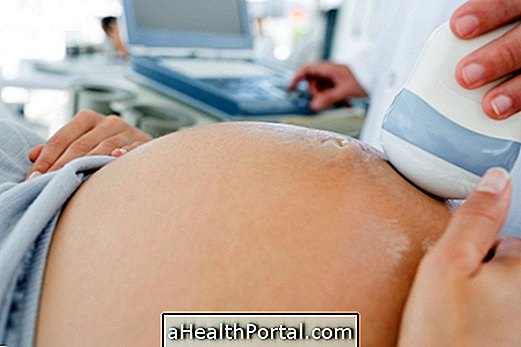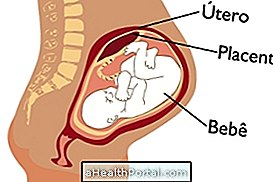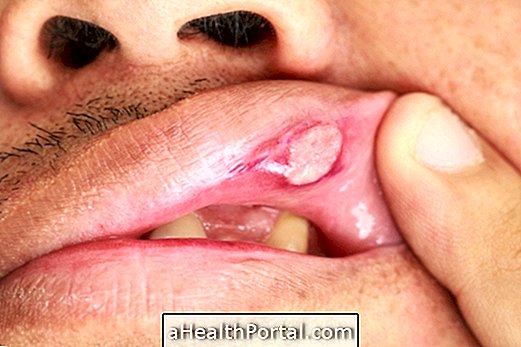During pregnancy it is very important that the woman goes to the dentist frequently, in order to maintain good oral health, since she is more susceptible to developing dental problems, such as gingivitis or the appearance of cavities, due to the hormonal changes characteristic of pregnancy.
Although going to the dentist is recommended, it is necessary to have extra care, avoiding very invasive or prolonged procedures and administration of certain medications.

Dental problems that can arise in pregnancy
The pregnant woman is more susceptible to suffering gingival inflammation, due to the hormonal changes that occur in pregnancy. The hormones circulate in greater concentration, penetrating the tissues and passing to the saliva, making the tissues, namely the gums, more sensitive to changes.
The progestogens contribute to the increase in the permeability of the capillary vessels of the gums and to the reduction of the immune response.
In addition, changing eating times, eating food between meals, and acidic erosion of teeth caused by vomiting can also increase the risk of developing dental problems.
All of these factors create adverse conditions in the oral environment, which can lead to the emergence of:
1. Gingivitis gravidarum
Gingivitis is characterized by a bright red color of the gums, with a smooth and shiny surface texture, with loss of elasticity and an increased tendency for bleeding, which is very common in pregnancy, affecting a large percentage of pregnant women.
Gingivitis usually appears in the 2nd semester of pregnancy, and can progress to periodontitis, if not treated, hence the importance of visiting the dentist. Learn how to identify the symptoms of gingivitis and how the treatment is done.
2. Granuloma of pregnancy
Granuloma consists of the appearance of asymptomatic thickening of the gums, which is intense red in color and very easy to bleed.
Generally, these thickenings disappear after delivery, so they must be removed by surgery. Only the cases that present excessive bleeding or impaired oral functions, which should be performed surgery, preferably in the 2nd trimester.
3. Caries
The changes that occur in pregnancy, favor the appearance of cavities, which consist of an infection of the teeth caused by bacteria naturally present in the mouth, which perforate the enamel of the teeth, which can cause pain. Learn how to identify a tooth decay.

Safe dental treatments for pregnant women
The ideal is to invest in prevention, maintaining good oral hygiene, and consulting the dentist frequently, in order to avoid the appearance of dental problems. If treatment is necessary, it may be necessary to take some precautions with regard to certain interventions or the administration of medications.
Can the pregnant woman receive anesthesia?
General anesthesia should be avoided, and local anesthesia should be preferred. Local anesthetics are safe throughout the gestation period, with no contraindications for their use, with the exception of mepivacaine and bupivacaine. Although they have the ability to cross the placental barrier, they are not related to teratogenic effects. The most commonly used anesthetic solution is 2% lidocaine with epinephrine.
Is it safe to do X-rays during pregnancy?
Radiation should be avoided during pregnancy, especially during the 1st trimester. However, if it is really necessary, care must be taken to avoid harming the baby, such as the use of a lead apron and the use of quick films to take the radiograph.
Which remedies are safe in pregnancy?
The use of medications should only be done if it is really necessary. In some cases, the use of antibiotics to fight an infection may be recommended, with penicillin derivatives such as amoxicillin or ampicillin being the most recommended. In case of pain, the dentist can recommend paracetamol, avoiding as much as possible anti-inflammatory drugs that are not recommended in pregnancy, especially during the 3rd trimester.
Is tooth restoration recommended in pregnant women?
In the 1st and 3rd trimester, dental treatments should be avoided, except for urgent cases. The 2nd semester is the one in which it is more appropriate to carry out the treatments, avoiding major restorations or aesthetic treatments, avoiding the waiting time and reducing the time for consultations. In addition, the pregnant woman should be in a position in which she feels comfortable.
Was this information helpful?
Yes No
Your opinion is important! Write here how we can improve our text:
Any questions? Click here to be answered.
Email in which you want to receive a reply:
Check the confirmation email we sent you.
Your name:
Reason for visit:
--- Choose your reason --- DiseaseLive betterHelp another personGain knowledge
Are you a health professional?
NoMedicalPharmaceuticalsNurseNutritionistBiomedicalPhysiotherapistBeauticianOther
Bibliography
- MARTINS, Isabel Alexandra da Silva. DEGREE OF ORAL HEALTH CARE IN PREGNANT. Dissertation of application for the Master's degree presented to the Faculty of Dental Medicine of the University of Porto, 2000. Faculty of Dental Medicine of the University of Porto.
- VASCONCELOS, Rodrigo Gadelha. Dental care for pregnant patients: how to proceed safely. Rev. bras. odontol .. V.69. 1.ed; 120-124, 2012






















